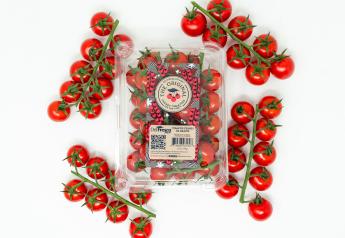Guatemala ag exporters: Lower transportation rates, or migrants will come

The subject line of the e-mail certainly grabs your attention: “Guatemalan exporters of agricultural products call on maritime shipping lines and on airlines to help to improve Guatemala’s rural competitiveness and prevent migration to the United States.”
The news release, from Guatemala ag exporters distributed a release that said:
“More than hundreds of thousands of producers of fresh and frozen agriculture products in rural Guatemala rely on the income generated from exports to markets like the United States. Yet, with the COVID-19 pandemic, strong competition from other countries, climate challenges and ever increasing maritime and air freight shipping costs, the income of thousands of agriculture families are at risk, putting thousands of jobs at stake and leaving migration to the United States as the only solution for producers in rural areas to obtain the income and economic viability to support their families.”
One saying that you hear from some growers in the U.S. is “Import people or import crops.” Unless they have access to immigrant farm workers, the crops that fill American tables will have to come from other countries.
The essential message from Guatemala ag exporters (my words) is “Make it easier for us to export our crops to the U.S. or prepare for a wave of undocumented immigrants.”
Is this overstated hyperbole or an earnest plea?
More from the release:
“Guatemala’s agriculture sector has been one of the most resilient sectors in the country, despite the strong negative economic impact and costly changes that the COVID-19 pandemic brought on to it. As agriculture products are vital to keep a healthy body with a strong immune system, the entire value chain had to adapt to different additional biosafety measures as well as new logistics regulations to continue supplying different international markets, mainly the United States, Guatemala’s main trading partner. As much as 80% of the total TEUs exported to the United States belong to agriculture products (including coffee, banana, sugar, flowers, fruits, and vegetables). Most of these products are shipped on temperature-controlled containers.”
Current conditions have not been easy for agriculture companies in Guatemala. On the one hand, according to statistics, international demand for fruits, vegetables and roasted coffee has increased, mainly among US consumers. A recent market study on consumer sentiment from the Produce Marketing Association (PMA) pointed out that consumption of fruits and vegetables as of June 2020 increased 11% compared with March of this year, when the COVID-19 pandemic started.
However, while demand for agriculture products has increased, Guatemalan companies of peas and vegetables (which account for no less than 60,000 producers nationwide in addition to thousands of indirect labor) have only been able to work at half their capacity, significantly increasing all their costs, including production costs. These companies were faced with many challenges which forced them to abandon fields, harvest much less product already ready for the picking, confront shortage of labor for the post harvest handling and shipping of their products already paid by international clients, and finally the selling of their products already at lower prices compared with prices prior to the start of the pandemic.
A similar situation for example is being experienced by the more than 60,000 producers of flowers and ornamental plants, 70% of them being women. Exports of ornamental plants have been on hold almost completely as their demand has dropped significantly and one of the most important days in the year for this industry, Mother’s Day, virtually did not take place in 2020 as economies all over the world were on lockdowns by that time to prevent the spread of COVID-19. And similar cases are found in the majority of agriculture products produced and exported by Guatemala.
“Rural agriculture workers in Guatemala are really feeling the economic impact of the very high maritime and air freight shipping rates, just when the economy is trying to recover from Covid19. We understand that all industries took a hit with the pandemic, which is why we are calling on maritime shipping lines, especially Seaboard and Crowley, and on airlines, especially cargo airlines, to start negotiations with Guatemalan agriculture industries to find the best way to support the rural competitiveness of Guatemala and be able to keep suppling the US market with top-quality agriculture products like mangoes, pineapples, berries, limes, roasted coffees and vegetables in terms of flavor, color and size; said Mr. Andrés Bickford, Manager of AGEXPORT’s Agriculture Sector.
For the past three years, exports to the United States (measured in TEUs) have kept a steady growth rate of 5%, reaching 327,358 TEUs in 2019. During the first semester of 2020, US ports mainly received perishable products from Guatemala, being the peak season for most fruits and vegetables. Among other products, Guatemala also shipped garments, food, and other manufacturing products.
We recognize that the customer experience, service, and expertise on handling fresh vegetables that maritime shipping lines provide give us the trust to continue using their containers for our daily operations. We want to negotiate with them a much better container rate, door-to-door, from the packaging plants in Guatemala to our clients’ distribution centers in the United States, and for all agriculture products.
A better shipping rate would have a strong economic impact on the entire value chain, especially on the income of the small producers and on the competitiveness of their products. In addition, it is a win-win situation as well for the shipping lines, as they guarantee themselves consistent volume from long-lasting clients of fresh and frozen agriculture products while also cooperating to stop migration influxes from Guatemalan rural areas to the United States, which is the first thing that happens when formal jobs are lost in our country; said Mr. Bickford.”
TK: Although a huge majority of Guatemalan peas, vegetables, and fruits shipments are shipped to Florida, there are only six maritime shipping lines to Florida, according to the release.
I’m not sure of the status of the negotiations but the gauntlet has been thrown down by Guatemalan exporters. Make it better quick, or else.







